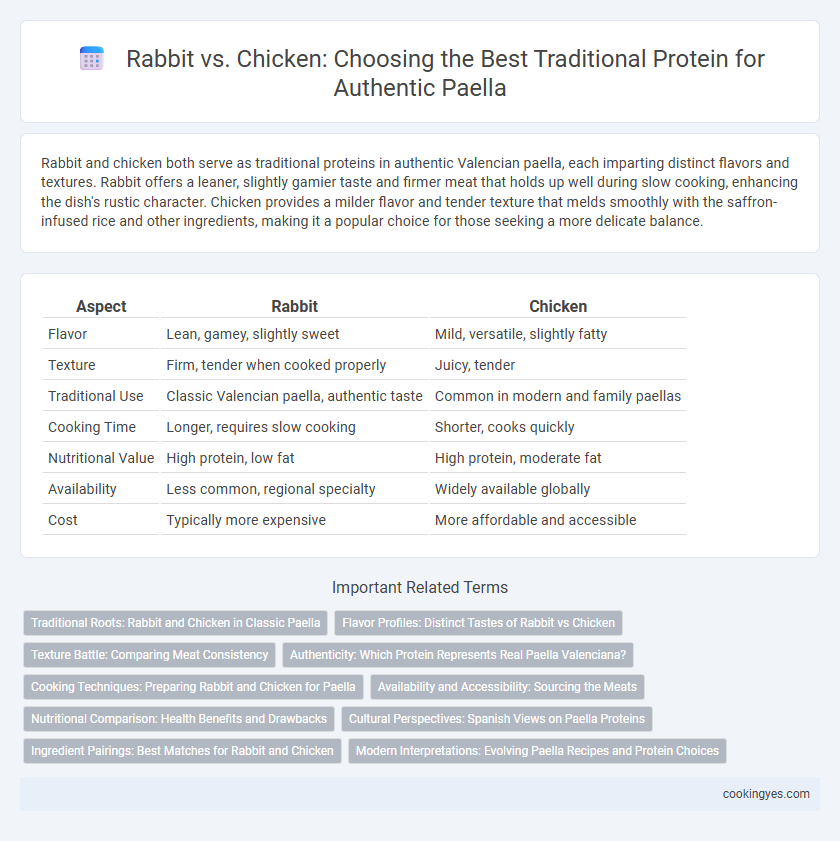Rabbit and chicken both serve as traditional proteins in authentic Valencian paella, each imparting distinct flavors and textures. Rabbit offers a leaner, slightly gamier taste and firmer meat that holds up well during slow cooking, enhancing the dish's rustic character. Chicken provides a milder flavor and tender texture that melds smoothly with the saffron-infused rice and other ingredients, making it a popular choice for those seeking a more delicate balance.
Table of Comparison
| Aspect | Rabbit | Chicken |
|---|---|---|
| Flavor | Lean, gamey, slightly sweet | Mild, versatile, slightly fatty |
| Texture | Firm, tender when cooked properly | Juicy, tender |
| Traditional Use | Classic Valencian paella, authentic taste | Common in modern and family paellas |
| Cooking Time | Longer, requires slow cooking | Shorter, cooks quickly |
| Nutritional Value | High protein, low fat | High protein, moderate fat |
| Availability | Less common, regional specialty | Widely available globally |
| Cost | Typically more expensive | More affordable and accessible |
Traditional Roots: Rabbit and Chicken in Classic Paella
Traditional paella authentically features rabbit and chicken as its primary proteins, reflecting the rural origins of Valencia, Spain. Rabbit provides a distinctive, slightly gamey flavor while chicken offers a tender, mild taste, both essential for balancing the dish's rich saffron-infused rice. Using these proteins honors the original recipe and preserves the cultural heritage intrinsic to classic paella.
Flavor Profiles: Distinct Tastes of Rabbit vs Chicken
Rabbit meat in traditional paella offers a gamey, slightly sweet flavor with a tender and lean texture, enhancing the dish's rustic authenticity. Chicken provides a milder, more familiar taste with juicier, fattier meat that absorbs saffron and spices well, creating a comfortingly rich profile. The choice between rabbit and chicken significantly influences the depth and regional character of traditional paella's flavor.
Texture Battle: Comparing Meat Consistency
Rabbit meat in traditional paella offers a firmer, leaner texture that holds up well during the long cooking process, providing a slightly gamey flavor that contrasts with chicken's tender, juicier consistency. Chicken, especially when using thigh cuts, delivers a softer bite and more succulent mouthfeel that readily absorbs the saffron-infused broth, making it a popular choice for a milder taste. The texture battle between rabbit and chicken ultimately depends on preference for either a hearty chewiness or a tender, moist protein in authentic Valencian paella.
Authenticity: Which Protein Represents Real Paella Valenciana?
Traditional Paella Valenciana authenticates its roots with rabbit as the primary protein, complemented occasionally by chicken to enhance flavor complexity. Rabbit delivers a distinct, gamey taste that aligns with the original 18th-century recipes from Valencia, Spain, while chicken offers a milder alternative more common in modern adaptations. Purists consider rabbit essential for an authentic paella experience, preserving the dish's historical and regional integrity.
Cooking Techniques: Preparing Rabbit and Chicken for Paella
Traditional paella recipes often call for rabbit or chicken, with each protein requiring specific preparation techniques to enhance flavor and texture. Rabbit meat is typically cut into small, uniform pieces and marinated before browning to tenderize its lean texture, ensuring a rich, savory depth in the paella. Chicken pieces, usually bone-in and skin-on, are seared until golden brown to develop a crispy exterior and retain moisture, contributing to a juicy, succulent final dish.
Availability and Accessibility: Sourcing the Meats
Rabbit meat for traditional paella is often less accessible due to limited availability in supermarkets and specialty butchers, especially outside Mediterranean regions. Chicken is widely available and easier to source year-round, making it the preferred protein for many home cooks and restaurants worldwide. The choice between rabbit and chicken often hinges on local market accessibility and cultural preferences rather than flavor alone.
Nutritional Comparison: Health Benefits and Drawbacks
Rabbit meat in traditional paella offers higher protein content and lower fat levels compared to chicken, making it a leaner option that supports muscle growth and cardiovascular health. Chicken provides more iron and zinc, essential for immune function and energy metabolism, but has a higher fat content that may impact cholesterol levels when consumed frequently. Choosing rabbit enhances the dish's nutritional profile with fewer calories and saturated fats, while chicken contributes vital minerals but requires moderation to balance health benefits and drawbacks.
Cultural Perspectives: Spanish Views on Paella Proteins
Rabbit is traditionally favored in Valencia, Spain, for authentic paella due to its lean meat and historical availability, imparting a distinct earthy flavor that aligns with regional culinary heritage. Chicken is often used in other parts of Spain, reflecting local tastes and accessibility, offering a milder, familiar protein that appeals to broader audiences. Both proteins symbolize regional identities within Spanish cuisine, where paella ingredients serve as markers of cultural pride and gastronomic tradition.
Ingredient Pairings: Best Matches for Rabbit and Chicken
Rabbit pairs excellently with aromatic rosemary, garlic, and green beans, enhancing the earthy flavors typical of traditional Valencian paella. Chicken complements sweet red peppers, tomatoes, and saffron, creating a rich and mellow profile that balances the dish's savory notes. Both proteins benefit from the addition of short-grain bomba rice and smoky paprika to unify the paella's texture and taste.
Modern Interpretations: Evolving Paella Recipes and Protein Choices
Modern interpretations of paella often experiment with protein choices, balancing tradition and innovation by incorporating both rabbit and chicken to enrich flavor complexity. Rabbit, known for its lean meat and distinct taste, adds a rustic depth that contrasts with the milder, tender chicken, which offers a familiar and versatile option. Culinary trends emphasize sustainability and local sourcing, prompting chefs to blend these proteins or substitute them with other alternatives while honoring the dish's Valencian roots.
Rabbit vs Chicken for traditional Paella protein Infographic

 cookingyes.com
cookingyes.com